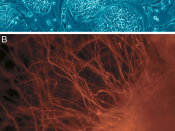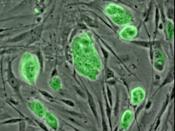Stem Cells and Public Policy
By: Natalie Whitney
Stem cells are a steady rising topic in public policy here in the United States. Research on stem cells is supposed to about advancing our knowledge about how we can develop an organism from single cell and how its cell can later be used to help adult organisms. Scientists are investigating this possibility of cell-based therapies to treat diseases such as diabetes and Parkinson's disease. Like a lot of other expanding fields of scientific discovery and research, research on stem cells raises lots of questions regarding life--when it begins, and who can play with it. The government has now set limits on stem cell research, but is it really putting us behind on medical discoveries?
First to provide some background I think it is best to explain what stem cells are, why they are important, and what they are supposed to be used for.
"Stem cells have the capacity for prolonged self-renewal and can produce at least one type of highly differentiated descendant" (Holland). Stem cells are also referred to as human embryo stem cells or hES. In adults, they are present in many tissues or cells such as bone marrow. hES cells have two important characteristics that distinguish them from other types of cells. Stem cells are able to renew themselves for long periods through cell division and they can be made to become cells with special functions like the insulin-producing cells of the pancreas or the beating cells of the heart muscle. The hES cells are most important because they are pluripotent--they are able to develop into many types of tissues. They are also immortal--able to continue dividing indefinitely without losing their genetic structure (Holland). They can be manipulated without losing cell function. All of these qualities make the study...


